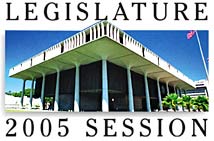Minimum-wage bill
advances in House
A plan would raise Hawaii's
hourly rate by 50 cents next year
State lawmakers moved a step closer to increasing the minimum wage in Hawaii but still have to agree on the amount of the increase.
|
Other measures debated yesterday included the standard deduction for income tax filing, voting by mail, campaign spending, regulation of over-the-counter drugs used to make crystal methamphetamine, and an unsuccessful attempt by House Republicans to repeal the "bottle bill."
House members have advanced a proposal that would raise the minimum wage by 50 cents to $6.75 an hour beginning Jan. 1. The hourly wage would go to $7.25 in 2007. The Senate had approved a wage hike to $7 an hour starting next year and going to $8 hourly in 2008.
"It's the right thing to do for our working poor, our young workers entering the work force and our seniors who are forced to take jobs to deal with the escalating costs of welfare and coping with the Medicare system," said House Labor Chairman Kirk Caldwell (D, Manoa).
While only two members voted against the proposal, Senate Bill 294, House Draft 1, others expressed concerns that it could lead to higher costs for small businesses and greater unemployment.
"When you get out in the private sector, it's a tough, tough world," said House Minority Leader Galen Fox (R, Waikiki-Ala Moana). "When employers face the prospect of being forced to raise wages or given the choice of hiring another employee, those kinds of considerations often result in people not being hired."
Despite his concerns, Fox voted for the measure.
The minimum wage was raised to the current $6.25 in 2003.
The Lingle administration has not spoken out against a wage increase, but has asked lawmakers to consider other measures to help the working poor, such as increasing the standard tax deduction.
While the House yesterday passed a proposal to raise the standard deduction, Democratic leaders in the Senate have said any such tax breaks are unlikely this year because of pay raises expected for state workers.
Other measures advanced yesterday included:
» S.B. 433, H.D. 1, which requires the Office of Elections to establish a vote-by-mail pilot program for the 2006 elections in the three representative districts with the lowest voter turnout rate in the last two election cycles.
» S.B. 1100, H.D. 1, which requires any product containing the medication pseudo-ephedrine be dispensed by a licensed pharmacist. The measure is aimed at cracking down on the manufacturing of the drug "ice," which is made with pseudoephedrine.
» House Bill 1713, Senate Draft 2, would create a system of public funding for political candidates running for governor, lieutenant governor and prosecuting attorney. Both chambers also passed bills that would limit amounts that can be contributed to campaigns.
House members also advanced S.B. 212, H.D. 2, which establishes financial incentives to develop more centers for the deposit beverage container redemption program, or bottle bill.
Majority Democrats passed the measure after turning back an attempt by the GOP to repeal the program. It was the second time this year that Republicans have attempted a repeal on the House floor.
A repeal "just makes so much sense, it's hard to believe there is so much resistance in this chamber," said Minority Floor Leader Colleen Meyer (R, Laie-Kahaluu). "There is no other issue I have received more complaints about."
Democrats urged GOP colleagues to work with them to make the program more efficient. "We should get behind this bill, fix up the inefficiencies ... and work with the small-business people who are trying to provide a valuable service and move forward, not back," Caldwell said.
[News] [Business] [Features] [Sports] [Editorial] [Do It Electric!]
[Classified Ads] [Search] [Subscribe] [Info] [Letter to Editor]
[Feedback]

